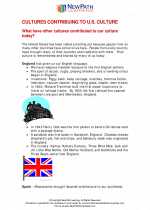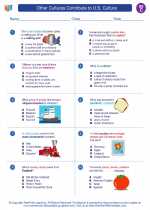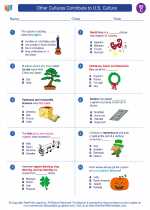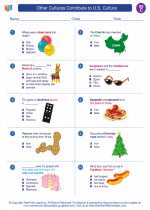National Curriculum Standards for Social Studies (NCSS)
CULTURE
SOCIAL STUDIES PROGRAMS SHOULD INCLUDE EXPERIENCES THAT PROVIDE FOR THE STUDY OF CULTURE AND CULTURAL DIVERSITY.
KNOWLEDGE - Learners will understand:
'Culture'' refers to the behaviors, beliefs, values, traditions, institutions, and ways of living together of a group of people.
Concepts such as: similarities, differences, beliefs, values, cohesion, and diversity.
How culture may change in response to changing needs and concerns.
How peoples from different cultures develop different values and ways of interpreting experience.
PROCESSES - Learners will be able to:
Explore and describe similarities and differences in the ways various cultural groups meet similar needs and concerns.
TIME, CONTINUITY, AND CHANGE
SOCIAL STUDIES PROGRAMS SHOULD INCLUDE EXPERIENCES THAT PROVIDE FOR THE STUDY OF THE PAST AND ITS LEGACY.
KNOWLEDGE - Learners will understand:
Key symbols and traditions that are carried from the past into the present by diverse cultures in the United States and world.
INDIVIDUALS, GROUPS, AND INSTITUTIONS
SOCIAL STUDIES PROGRAMS SHOULD INCLUDE EXPERIENCES THAT PROVIDE FOR THE STUDY OF INTERACTIONS AMONG INDIVIDUALS, GROUPS, AND INSTITUTIONS.
KNOWLEDGE - Learners will understand:
Concepts such as: community, culture, role, competition, cooperation, rules, and norms.
GLOBAL CONNECTIONS
SOCIAL STUDIES PROGRAMS SHOULD INCLUDE EXPERIENCES THAT PROVIDE FOR THE STUDY OF GLOBAL CONNECTIONS AND INTERDEPENDENCE.
PROCESSES - Learners will be able to:
Describe examples in which language, art, music, belief systems, and other cultural elements can facilitate global understanding or cause misunderstanding.
National Standards for Civics and Government (NSCG)
What are the Basic Values and Principles of American Democracy? What are the most important values and principles of American democracy?
Fundamental values and principles: Students should be able to explain the importance of the fundamental values and principles of American democracy. To achieve this standard, students should be able to
Explain the importance for themselves, their school, their community, and their nation of each of the following fundamental values of American democracy:
Diversity
What are the Basic Values and Principles of American Democracy? What are the benefits of diversity in the United States?
Diversity in American society: Students should be able to describe diversity in the United States and identify its benefits. To achieve this standard, students should be able to
Explain the meaning of the word diversity
Identify common forms of diversity in the United States, e.g., ethnic, racial, religious, class, linguistic, gender, national origin
Explain why there is so much diversity in the United States
Describe some benefits of diversity, e.g., it
Fosters a variety of viewpoints, new ideas, and fresh ways of looking at and solving problems
National Center for History in Schools (NCHS)
Topic 3: The History of the United States: Democratic Principles and Values and the People from Many Cultures Who Contributed to Its Cultural, Economic, and Political Heritage
The causes and nature of various movements of large groups of people into and within the United States, now, and long ago.
Demonstrate understanding of the movements of large groups of people into his or her own and other states in the United States now and long ago.
Regional folklore and culture contributions that helped to form our national heritage.
The student understands folklore and other cultural contributions from various regions of the United States and how they help to form a national heritage.
Topic 4: The History of Peoples of Many Cultures Around the World
Selected attributes and historical developments of various societies in Africa, the Americas, Asia, and Europe.
The student understands the cultures and historical developments of selected societies in such places as Africa, the Americas, Asia, and Europe.
Major discoveries in science and technology, their social and economic effects, and the scientists and inventors responsible for them.
The student understands the development of technological innovations, the major scientists and inventors associated with them and their social and economic effects.

 Worksheet/Answer key
Worksheet/Answer key
 Worksheet/Answer key
Worksheet/Answer key
 Worksheet/Answer key
Worksheet/Answer key
